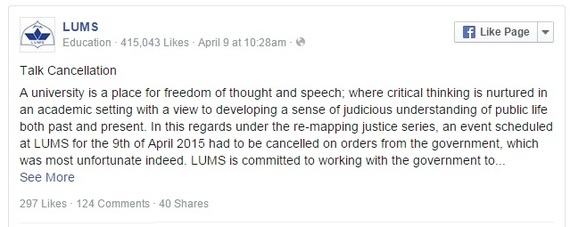The brutal killing of Pakistan's human rights activist, Sabeen Mahmud, has not only stunned Pakistanis, but has also sent shock waves, which are rippling through the global social media.
She is also the latest victim, among the recent range of murders of human rights activists and journalists in Pakistan including, Rashid Rehman, Perween Rahman, Murtaza Rizvi, and Masood Hamid.
Rashid Rehman was the regional director of Pakistan Human Rights Commission; Perween Rahman was managing the Orangi Pilot Project serving one of the disadvantaged communities of Sindh province. Murtaza Rizvi, and Masood Hamid were the distinguished journalists associated with Pakistan's major news organization, the Dawn group.
These murderous attacks are a continuum that has seen senior journalists like Hamid Mir, and Raza Rumi also being attacked with bullets, though both survived. Hamid Mir continues his work in Pakistan and Raza Rumi has been forced into exile like Pakistan's former ambassador to the United States, Hussain Haqqani and others.
The fact that journalists in Pakistan live under siege and are attacked with impunity has been recorded many times. A report by Amnesty International, reviews this phenomenon and also shows that perpetrators of the crimes are neither found, nor ever prosecuted.
Various reports by Human Rights Watch have included the plight of human rights abuses in Pakistan, and have also highlighted the issue of missing persons in Pakistan's Balochistan Province. It is an issue that has not captured wide attention among the rights activists globally. The 2015 HRW report includes:
"Enforced disappearances linked to the security forces continued with impunity. On March 18, plainclothes gunmen later identified as belonging to Pakistan's Frontier Corps allegedly abducted Zahid Baloch, chairperson of the Baloch Students Organization -- Azad, in the provincial capital Quetta. Baloch's safety and whereabouts remained unknown at the time of writing. Despite ruling from Pakistan's Supreme Court in 2013, demanding justice for victims of enforced disappearances, as well as recommendations from the UN Working Group on Enforced, or Involuntary Disappearances in 2012, Pakistan's government has failed to meet its obligations, under the constitution, and international law prohibiting enforced disappearances."
While Sabeen Mahmud's philanthropy and human rights activism, as the founder of T2F and Peace Niche, had many shining facets, it could be her last act -- of highlighting the plight of Balochistan's missing persons -- that may have taken her life.
T2F, has been a unique Arts, Culture, Literature, and Events space, that many put on their itinerary when visiting the plight ridden metropolis of Karachi to find some peace and solace. T2F website reads:
"since our inception in May 2007, T2F has hosted hundreds of events, ranging from poetry readings and film screenings, to vibrant debates on critical issues. With the support and participation of musicians, artists, writers, film makers, scientists, comedians, thought leaders, and engaged audiences, T2F has contributed to revitalizing Karachi's cultural landscape and has provided an alternative, independent, safe space for discourse."
The last event at T2F, just before Sabeen Mahmud's murder was a talk, on Balochistan. "Unsilencing Balochistan (Take 2): In Conversation with Mama Qadeer, Farzana Baloch & Mir Mohammad Ali Talpur." It also included journalist Wusat Ullah Khan, who is known for his incisive commentaries on Pakistani society and politics.
The event hosted Mama Qadeer, a Baloch activist who has been leading a thousands-of-kilometres-long march by foot from Balochistan to other areas of Pakistan with a very small group of supporter to demand justice for Balochistan's missing persons.
His efforts have generally been ignored by Pakistan's media and authorities in general and he has been barred from traveling out of Pakistan.
A similar earlier event to be organized at Pakistan's reputed liberal university LUMS was cancelled, and the organizers blamed it on pressures by authorities.
This is what the university issued as a calrificaton:
Sabeen Mahmud carried out the event at T2F, despite allegedly receiving threats, and even when her moderator and another journalist backed out of the event at the last minute. She was killed in a hail of bullets soon after the event, on her way home. Her mother was also seriously injured but survived.
According to report published at Wall Street Journal, "Many blamed the military and its intelligence agencies for the assassination of Ms. Mahmud, a charge the military refutes." In a rare move, Pakistan Army' s media wing ISPR announced that it will probe and assign resources to Sabeen Mahmaud's murder.
According to report published at Wall Street Journal, "Many blamed the military and its intelligence agencies for the assassination of Ms. Mahmud, a charge the military refutes." In a rare move, Pakistan Army' s media wing ISPR announced that it will probe and assign resources to Sabeen Mahmaud's murder.
Her murder is creating a temporary chill and fear among Pakistan's liberal and progressive communities. This was perhaps what the killers wanted to achieve, and are apparently successful.
However, Pakistan has a long history of dissidence and struggle for human rights, where leading writers, poets, artists, students, labour leaders, and journalists, including men and women have sacrificed and given their lives. Mahmud was the latest flickering candle that has been so brutally snuffed. But her light continues to guide hundreds of young activists whom she nurtured over many years, and they will carry the torch forward. They are also determined that they will lend their voices to voiceless missing people of Balochistan, and to other abuses of rights.


No comments:
Post a Comment